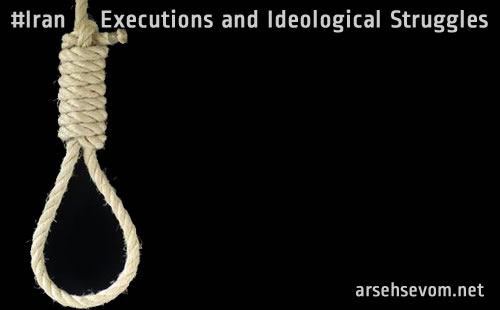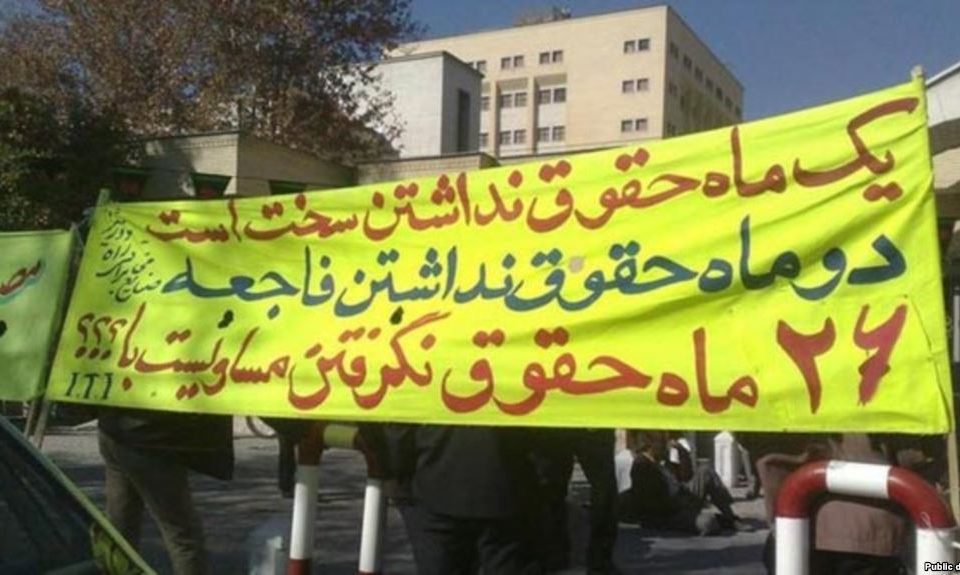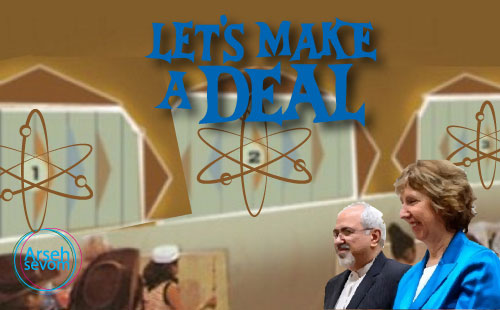
#Iran: Let’s Make a (Nuclear) Deal
October 21, 2013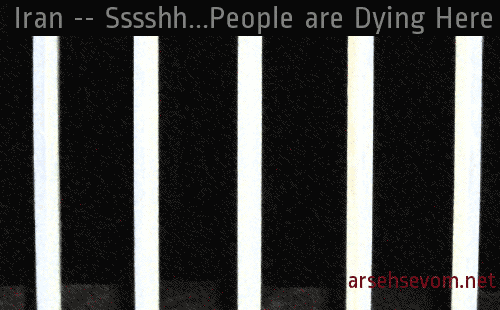
#Iran — Ssshh…People are Dying Here
November 6, 2013Arseh Sevom — The ideological struggle between reform and restriction is being played out in many arenas in Iran. Last week, hardliners hung billboards opposing negotiation with the West, this week they were taken down and replaced with less combative messages. The ministry of culture promised to liberalize the publication process, while a reformist newspaper was ordered shut down. For those condemned to execution in Iran, there has been no change for the better, with increases in the number of executions. This was dramatically played out over the weekend when 16 prisoners were executed in response to a deadly attack on Iran’s border guards.
By Peyman Majidzadeh
Executions Continue, UN Rapporteur Demands Improvement
The UN Special Rapporteur for human rights in Iran, Ahmed Shaheed, released his latest report [en] on October 23. Mr. Shaheed condemned the high rate of executions this year and ongoing restrictions on freedom of expression in Iran. Shaheed sees “no sign of improvement.”
Iran’s Foreign Ministry reacted [en] to Mr. Shaheed’s report and called it “biased and based on political motivations.”
The unfortunate fact is that executions continued even after the new government began its term to the extent which, according to Radio Farda [fa], the country even made a new record on it. Improvement is indeed necessary.
Retaliatory Executions
In the poverty-stricken province of Sistan-Baluchestan, 16 prisoners the government claims had ties to violent opposition groups. were executed. This was in retaliation for an attack on border guards that left at least 14 dead.
The group Jaish al-Adl claimed responsibility for the attacks, claiming that they were in response to massacres in Syria and the harsh treatment of the Sunni minority in Iran. The BBC has more http://www.bbc.co.uk/news/world-middle-east-24682729
Women’s Voices: The Sound of Silence
Iranian women are required to wear hijab in public, and the story doesn’t end here. They do not even have the right to sing alone in public; a fact that many people around the world are not aware of. Sad but true. Last week the spokesman for Iran’s House of Music, Dariush Pir-Niakan demanded an end to the ban [en], saying:
“The main demand of the house of music is for women’s voice to be broadcast. For 34 years now, this has been missing from the musical arena. Music is still considered taboo here.”
After the demand, Pir-Niakan was fired (or forced to resignation, according to some reports [fa]) on October 22. The sad point here is that there are many talented female singers inside Iran, standing behind closed doors. Nor fair. Not at all.
Sanctions on Iran: A Round-up
Iranian people remember 8 years of almost constant bad news on sanctions. Now the situation is a bit different. Good news and bad news are mixed, and this is good news! Let’s make a list:
- White House pushed Senate to delay new sanctions on Iran [fa]
- Some US Senators demanded more sanctions on Iran [fa]
- The European Council widened targeted sanctions on Iran [en]
- EU lifted sanctions against Iran Insurance Company, following defense presented by the corporation, reported ISNA [en]
- China resumed importing Iranian fuel oil [en]
- Iran’s oil sales in October will fall [en] to their second-lowest point in the Islamic Republic’s history, as a result of US-led sanctions
After the new government began its term in Iran, some groups and individuals argue dsanctions should be lifted. Of course, some others remain harsh on Iran, but that could change if domestic and foreign affairs improve.
The United States of America: Good or Evil?
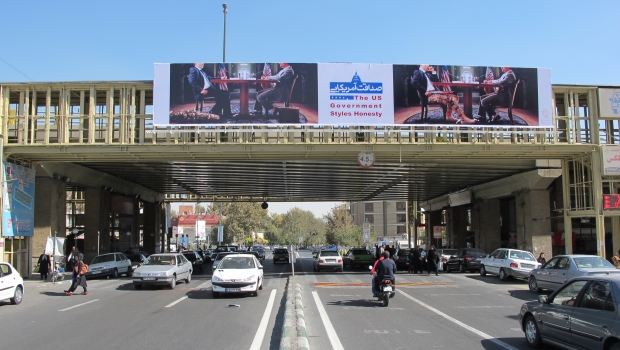 Photo from Ashaq Al Aswat
Photo from Ashaq Al Aswat
After the Rouhani-Obama phone call, Iran-US relations became a hot topic in both national and international media. Could the United States of America be trusted? Iranian hardliners think not.
An opinion poll [fa] conducted by Rouhani’s administration shows that more than 80% of Iranians want another (softer) approach to relations between the two countries.
Iran’s hardliners still see the United States of America as the Great Satan, trying to bring negotiation on the table and hide the evil thoughts [en] under it. In Tehran, billboards sprung up illustrating the message that negotiations are not to be trusted. In one, a US negotiator is portrayed as half civilian, half military. In other, he is shown with a salivating attack dog. In the last couple of days, however, many of them have been removed by authorities orders [fa]. It seems that the tug of war between hardliners and those who want some form of reconciliation is being played out in the streets.
Here is the billboard that replaced the anti-American one.
#IRAN: Replacement of Anti-American Poster pic.twitter.com/P6f0XUNnYZ
— Shahrzad Samii (@ShahrzadSamii) October 27, 2013
The billboard reads: “In a world with too much oppression, we will neither oppress nor be oppressed.”
The story does not stop there! Iran is to host the first ever, international Down With the U.S. Great Awards Festival with a lucrative cash prize offer of 2,500 Euro. You can check the website [en] for yourself and get inspired by themes offered to competitors.
Iran Economy: GDP Sinking
According to Radio Zamaneh [fa], the International Monetary Fund (IMF) issued its newest report, predicting that Iran’s GDP (gross domestic product) would fall from 548 billion dollars in 2012 to 388 billion dollars in 2013. The significant reduction shows serious problems in Iran’s economy, the most important of which is arguably the lack of transparency in financial processes. It is also worth mentioning that Iran’s parliament passed [fa] a revised budget with an empty treasury last week.
The good news is that, according to Tehran Emrooz daily [fa], the new government has issued an order to release some confidential data on the economic affairs of the country. This, if appropriately done, can bring more transparency and fix some problems of Iran’s ailing economy.
Student Activist on Furlough
After a number of political prisoners were freed from jail, the situation of the rest of them barely changed. They spent their time in prison, struggling with the same old problems. However, some good news was reported last week. Majid Tavakoli, the imprisoned Iranian student activist, went on a 4-day furlough [en] after four years. After release of the report, students of Amir Kabir University of Technology (where Tavakoli studied) made a joyful gathering [fa] for him.
There are also other political prisoners who need help. Some of them, like Mohammad Reza Pur Shajari [fa], are in poor health situation and face medicine shortages.
Iran Opens Doors for Writers
Iranian readers and writers have suffered from book censorship in recent decades. The process of publication is long and frustrating for writers, and the result is never guaranteed. But now, according to The Guardian [en], Iran’s Minister of Culture, Ali Jannati, has promised to improve the situation for publications in the country. He said that books subjected to censorship or denied permission to be published in the past will be reviewed again. Earlier this month he made an interesting comment [fa] on the issue:
I think if the Quran was not a divine revelation, the book supervisory board would say some words did not comply with public chastity and would deny its permission for publication.
Ironically, Iran has shut down [en] the daily Bahar, a reformist newspaper, over an article that allegedly undermined Islamic values. Last week, Bahar’s chief editors temporarily shut the publication down for two weeks, possibly in an effort to avoid the ban.


